

The End of Average: Todd Rose's '8 for 8' The Flipped Classroom Model: A Full Picture. Due to Khan Academy’s popularity, the idea of the flipped classroom has gained press and credibility within education circles. How Do I Get Started? A Step-by-Step Guide to Designing a Student-Centered Classroom, Pt 1. No grades, no timetable: Berlin school turns teaching upside down. Anton Oberländer is a persuasive speaker.
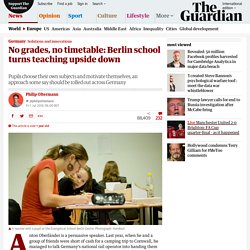
Last year, when he and a group of friends were short of cash for a camping trip to Cornwall, he managed to talk Germany’s national rail operator into handing them some free tickets. So impressed was the management with his chutzpah that they invited him back to give a motivational speech to 200 of their employees. Anton, it should be pointed out, is 14 years old. The Berlin teenager’s self-confidence is largely the product of a unique educational institution that has turned the conventions of traditional teaching radically upside down. 9 Elephants in the (Class)Room That Should “Unsettle” Us — Modern Learning. “When I really try to square what I believe about how kids learn and what we practice in our classrooms, it unsettles me.”
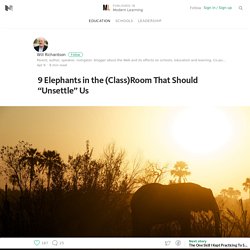
A t a recent morning workshop for school leaders at a fairly small New England public school district, about an hour into a conversation focused on what they believed about how kids learn best, an assistant superintendent somewhat surprisingly said aloud what many in the room were no doubt feeling. “When I really try to square what I believe about how kids learn and what we practice in our classrooms, it unsettles me,” she said.
“And it frustrates me.” How to make a good teacher. FORGET smart uniforms and small classes.
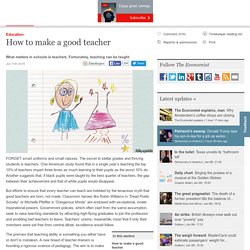
The secret to stellar grades and thriving students is teachers. One American study found that in a single year’s teaching the top 10% of teachers impart three times as much learning to their pupils as the worst 10% do. Another suggests that, if black pupils were taught by the best quarter of teachers, the gap between their achievement and that of white pupils would disappear. But efforts to ensure that every teacher can teach are hobbled by the tenacious myth that good teachers are born, not made. The Other 21st Century Skills: Educator Self-Assessment. Chartkamp–I think I understand what you are saying, but in any scenario, someone, or something will spur the impetus for learning to occur.
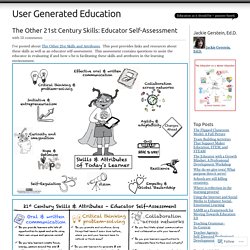
We could have a toddler go about and learn the world from scratch, but I don’t think anyone would say that is as efficient and as effective as a “parent” facilitating, or at least providing for a safe environment. And the better the parent, the more effective the toddler will be at contributing to the learning within the community as he/she progresses. ‘Big data’ was supposed to fix education. It didn’t. It’s time for ‘small data.’ (Original photo by Bigstock Washington Post photo illustration) For over a decade, “big data” and “analytics” have increasingly become a part of the education world.
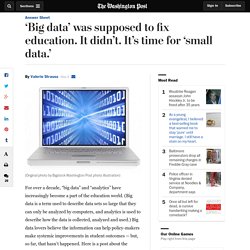
(Big data is a term used to describe data sets so large that they can only be analyzed by computers, and analytics is used to describe how the data is collected, analyzed and used.) Big data lovers believe the information can help policy-makers make systemic improvements in student outcomes — but, so far, that hasn’t happened. Want to fix education? First, we need to ‘Remake Learning’ — Learning Through Digital Play. For the past ten years, Gregg Behr has been executive director of The Grable Foundation, where he “manages a grantmaking portfolio advancing high-quality early childhood education, improved teaching and learning in public schools, and robust out-of-school time support, including digital, maker, and STEAM learning.”
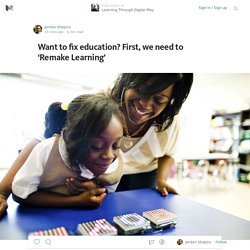
I recently met Gregg at Lego’s Idea Conference in Billund, Denmark. He described Pittsburgh’s Remake Learning Network and I was impressed. It is a unique approach to addressing education problems that leverages a community’s collective wisdom in a truly synthesized and participatory way. Work in the Future Will Fall into These 4 Categories. From The New York Public Library Organizations are more boundary-less, agile, global, and transparent — and will be even more so in the future.

Work and workers (yes, humans) will always be essential to organizations, but organizations themselves will be more diverse, and work will be organized, structured, and done in new ways, increasingly through arrangements outside of regular full-time employment. How can leaders navigate this new digital work ecosystem? How should your organization plan for the changes ahead? ‘Children being burdened with useless information’ The education system is burdening children with long syllabuses, laden with useless information and is one which shies away from critical thinking and a proper sex education, according to Children’s Commissioner Pauline Miceli.
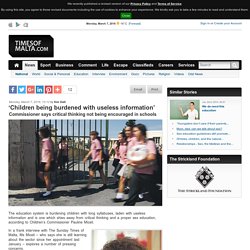
Pauline Miceli says that youngsters needed to be educated in acting responsibly. Photo: Matthew Mirabelli In a frank interview with The Sunday Times of Malta, Ms Miceli – who says she is still learning about the sector since her appointment last January – explores a number of pressing concerns. Unlike her predecessor, who had objected to the proposal of lowering the age of sexual consent, Ms Miceli highlights the irony in failing to accept that adolescents are sexual beings. Charles-Fadel. “Will this be on the test?” — The Startup. "L-edukazzjoni fl-iskejjel ma tistax tkun l-istess għal kulħadd" - Il-Ministru Bartolo - TVM.
[WATCH] Education minister calls for accessibility to post-secondary levels for children with learning issues. How this STEM school is shattering stereotypes - Feb. 9, 2016. In fact, the school was launched to do just the opposite.
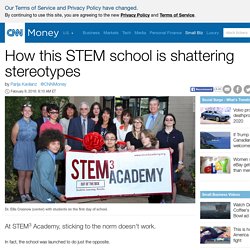
"Our emphasis is on learning versus teaching," said Dr. Ellis Crasnow, the school's director. "Our students learn by doing, experiencing and constructing rather than just sitting in a classroom listening to a teacher. " STEM3 Academy largely focuses on "STEM" subjects: science, technology, engineering and math). Teachers there use a "flipped classroom" model. How Finland broke every rule — and created a top school system. Spend five minutes in Jussi Hietava’s fourth-grade math class in remote, rural Finland, and you may learn all you need to know about education reform – if you want results, try doing the opposite of what American “education reformers” think we should do in classrooms.
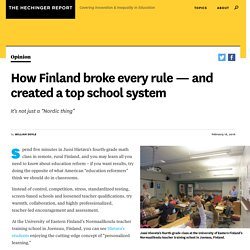
Instead of control, competition, stress, standardized testing, screen-based schools and loosened teacher qualifications, try warmth, collaboration, and highly professionalized, teacher-led encouragement and assessment. At the University of Eastern Finland’s Normaalikoulu teacher training school in Joensuu, Finland, you can see Hietava’s students enjoying the cutting-edge concept of “personalized learning.” Related: What high-performing countries have to teach us about teacher training But this is not a tale of classroom computers. A warning to college profs from a high school teacher. For more than a decade now we have heard that the high-stakes testing obsession in K-12 education that began with the enactment of No Child Left Behind 11 years ago has resulted in high school graduates who don’t think as analytically or as broadly as they should because so much emphasis has been placed on passing standardized tests.
Here, an award-winning high school teacher who just retired, Kenneth Bernstein, warns college professors what they are up against. Bernstein, who lives near Washington, D.C. serves as a peer reviewer for educational journals and publishers, and he is nationally known as the blogger “teacherken.” His e-mail address is kber@earthlink.net. This appeared in Academe, the journal of the American Association of University Professors. Can Design Thinking Help Schools Find New Solutions to Old Problems?
Principal Kamar Samuels had a problem: how to reach the most disaffected students at Bronx Writing Academy, a middle school serving mostly low-income students. The usual discipline methods weren’t working and Samuels knew that if he could figure out how to engage his toughest students, he’d have a playbook to reach them all. So, he decided to make those students his focus group, asking them what they liked about school, and really listened to the answers. That technique is part of a user-centered design approach he’s trying out in order to tackle some of the age-old problems in education, like low achievement for Latino and African-American boys, with a new lens.
The crowdsourced guide to learning. The End of Average: Todd Rose's '8 for 8' Do you teach individuals or ‘average’ students? There is no such thing as an average person. In the late 1940s, the United States Air Force couldn’t understand why pilots found it so physically difficult to keep control of their planes. After all, the cockpits had been designed to fit the dimensions of the average pilot.
Yet when researchers measured more than 4,000 pilots, they discovered that not a single one was average (defined as among the middle 30 per cent) for every one of the 10 different parameters they looked at. The Classroom Is Dead — Bright. The Classroom Is Dead. Education and Training Monitor calls for greater investment in education. Where Students Create Their Own Learning Experiences. 25 Trends Disrupting Education Right Now. 25 Trends Disrupting Education Right Now. How to Turn Your Classroom into an Idea Factory.
Digital Agenda for Europe. Commonwealth Certificate for Teacher ICT Integration. The Surprising Truth About Learning in Schools. Trends, challenges, and developments for higher education’s next 5 years. The digital revolution in higher education has already happened. No one noticed. For 1st time, MIT's free online classes can lead to degree. What Kids Want Out of School. Letter to a young learner. HASTAC: Changing the Way We Teach and Learn. Sixth form colleges left on starvation rations by government cuts, says report. Sixth form colleges are on “starvation rations” as a result of government funding cuts that have put their survival at risk, according to a report. Almost four out of every 10 sixth form principals say it is likely their college will cease to be a going concern within five years, according to Tuesday’s report, while seven out of 10 say they cannot provide students with a quality education with the money they are set to receive next year.
Resource Centre. Step by Step: Designing Personalized Learning Experiences For Students. The phrase “personalized learning” gets tossed around a lot in education circles. Sometimes it’s used in the context of educational technology tools that offer lessons keyed to the academic level of individual students. One vision of tomorrow’s college: Cheap, and you get an education, not a degree. Children 'in complete meltdown' over exams. Steve Hargadon: Escaping the Education Matrix. Report Finds ‘Deeper Learning’ Model Improves Outcomes for All Students. European Schoolnet.
Why Technology Will Never Fix Education. If you want teachers to innovate, don't train them using a sage on a stage. The skills agenda. The Reed Diaries: Reimagining the University #JiscCreativity #RadicalHE. Message to My Freshman Students The skills we all need but college doesn't teach. Interview: Education can’t be forced – Minister Evarist Bartolo. What the best education systems are doing right. 15 of the Best Blogs for Educators - Social Learning. Bridging the digital skills and literacy gap. The Classroom of the Future. ICDE » International Council for Open and Distance Education. Storytelling: A Powerful Marketing Tool. Labour calls time on 'exam factory' approach to schooling. Different Worlds of Policymakers and Teachers.
Members of new commission on assessment without levels announced. Make School a Democracy. Why they leave school early. Why Should Schools Teach Coding? Universal Skills All Learners Should Know How to Do. JISC: Exemplars of the Digital Student. The Other 21st Century Skills: Educator Self-Assessment. 10 Pros And Cons Of A Flipped Classroom. Best Education-Related Videos of 2014. Schools need freedom to thrive. 14 Posts from Modern Learners. Pasi Sahlberg. Opening up education through innovation.
25 Ways Teachers Can Integrate Social Media Into Education. Open Aire. Games Can Advance Education: A Conversation With James Paul Gee. Adventure '15. Education Week. What happens when computers, not teachers, pick what students learn? - The Hechinger Report.